Local News
While many more Israelis may be thinking of leaving the country, Manitoba has seen very few arrive here the past three years
By BERNIE BELLAN Elsewhere on this website you can read an article about how many Israelis are planning on leaving the country as a result of the radical shift in that country’s direction since the new government came into power (https://jewishpostandnews.ca/rss/alarmed-by-their-countrys-political-direction-more-israelis-are-seeking-to-move-abroad/). We wondered though whether that might lead to an upsurge in Israelis applying to come to Manitoba. If recent figures for the number of Israelis who have come here under the Provincial Nominee Program are any indication, then it seems that the number of Israelis who have been applying to come here has fallen drastically in the past three years.
In May 2022 we published an article about an increase in the number of applicants that Manitoba was going to be able to accept under the Provincial Nominee Program. The PNP is the program through which most immigrants coming to Manitoba arrive. At that time we predicted that the increase – from 6,275 to 6,367, would lead to an increase in the number of Israelis applying to move to Manitoba.
Recently the province announced that its allocation for 2023 under the PNP hds jumped almost 50% – to 9,500.
Yet, while the number of applicants who will be accepted under the PNP may be skyrocketing, it hasn’t translated into any marked increase in the number of Israelis who have applied to move here – either in 2022 or 2023.
We asked a spokesperson for Jon Reyes, Manitoba’s Minister of Advanced Education, Skills and Immigration, the following question: “How many applications under the PNP have you received from Israelis in the past year?”
The answer we received was: “In 2022, the Manitoba Provincial Nominee Program (MPNP) received 16 applications from Israeli citizens. In 2021, the MPNP received 7.”
The spokesperson for the minister also added this note: “I’m not sure if you were thinking those numbers would be larger, but it’s also possible that individuals/families arrive in a different province, and then move to Manitoba. In those instances, that wouldn’t be reflective in the province’s numbers.”
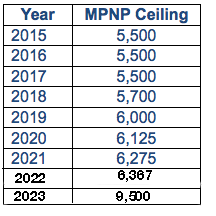
We also emailed the Jewish Federation, asking this question: “I’m wondering whether there has been an increase in inquiries from people living in Israel wanting to know about moving to Winnipeg. The reason I ask is obvious: There are so many Israelis wanting to leave the country now because of what the government is doing, but from what I’ve been reading the vast majority are applying to move to Europe. Is there anything you can tell me about how many have inquired in the past year about moving to Manitoba?”
Here is the answer we got back: “We have not gotten any indication of people leaving Israel and coming to Winnipeg due to the political situation there, at least as of now.”
Between 2017-2019 there had been a steady stream of Israelis who were allowed to move here under the PNP. When COVID hit in 2020, however, the number dropped – for obvious reasons, and it dropped even further in 2021. It increased slightly in 2022 – but nowhere near the levels it had been from 2017-2019.
Following the article we published last May about the Provincial Nominee Program, we received an email from an immigration consultant here who has a great deal of experience assisting Israelis with the process of emigrating to Manitoba. That person suggested that, as a result of the tightening of requirements under the PNP, fewer individuals from Israel were applying to come to Manitoba. We also wrote: “That individual also suggested that many immigrants who have come here have left Winnipeg as a result of not being able to find work in their chosen fields.”
In June 2022 we reported that the Jewish Federation was optimistic that immigration by Jewish families would bounce back in 2022. A spokesperson for the Federation wrote: “We have 75 people ready and willing to come to Winnipeg and continue with the immigration process, and with pandemic restrictions loosening, we anticipate numbers to bounce back from 2021. There are currently 300 individuals in various stages of producing required documents necessary to continue with the process.”
From time to time we have been reporting in this paper about new families having arrived in Winnipeg from other countries, including Turkey and Mexico (and in this issue, from Brazil) – and we will be continuing to report on new arrivals in coming issues, but again, we’re left wondering: Why aren’t more people coming here from Israel?
In our November 9 issue last year we reported on information gleaned from the 2021 census about the number of individuals in Winnipeg who reported that their ethnic origin was Israeli. The figure in the 2021 census was 1,435; in 2016 the figure was only 405. (We also explained that figures from the 2016 census were suspect because that census did not report Jewish or Israeli as one of the choices for ethnic origin. Respondents would have had to write in those answers. In 2021, by way of contrast, respondents were offered a check list of over 100 different choices for ethnic origin – this time including both “Jewish” and “Israeli” as possible answers.)
In either event, there was certainly a marked increase in the number of respondents in 2021 who gave “Israeli” as their ethnic origin.
But, as we also noted in another article (in our November 23 issue) about results of the 2021 census, there were also some very surprising figures about the religious background of individuals who said their ethnic origin was Israeli: “Of the 1350 individuals who said their ethnic origin was ‘Israeli’, only 855 said their religion was Jewish. Of the remainder, 385 said they had no religion, while 105 said they were Christian.”
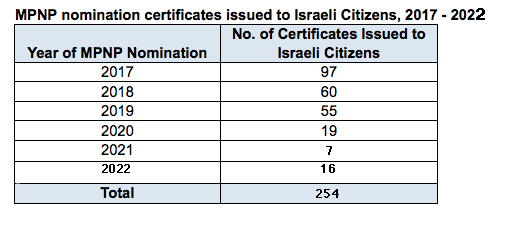
While there have also been a number of arrivals of Jewish families to Winnipeg from countries other than Israel, it’s been Israel that’s been by far the largest source of immigration to this city for Jewish families over the past 20 years.
And, while Winnipeg’s Jewish population showed an apparent increase from 2011 to 2021, when you combine figures for both ethnic origin and religion, the increase was fairly negligible. As I noted in my November 23rd article, a careful analysis of data from the 2021 census showed that, at a maximum, the number of individuals in Winnipeg who might be considered Jewish – either by ethnic origin or religion, was 14, 270 – and the figure was probably much lower than that.
So, what does this all signify? The rate of immigration from Israel to Manitoba has slowed over the past three years – even though the number of applicants who would be allowed to come here under the Provincial Nominee Program has jumped dramatically this year.
But last May, when we spoke with Dalia Szpiro, GrowWinnipeg Director for the Federation, she told us then that there was a large backlog of prospective immigrants who delayed coming here for exploratory visits as a result of Covid. In the past little while many individuals have now been coming here on those exploratory visits, Dalia said at the time.
Evidently though, very few of those prospective immigrants are from Israel – at least if figures released by the Manitoba government showing how few applicants under the PNP in the past two years have been from Israel.
In some respects, what is going on in Israel right now is reminiscent of what was being expressed when Donald Trump was elected President in 2016. Many Americans said then that they would leave the US as a result. While some did come to Canada, it turned out that our immigration requirements were far more onerous than many Americans had thought.
Last May, when we wrote about the PNP, we noted that Manitoba was seeking immigrants in specific areas.
At the time we asked the spokesperson for Minister Reyes: “Are there particular classes of immigrants that Manitoba is wanting to recruit? e.g., computer programmers, nurses, etc. (also good hockey players)?”
The spokesperson responded:
“The MPNP is an economic program that aims to address labour market needs by nominating skilled workers and business investors who satisfy program criteria – and who are employable in their areas of professional experience – across all industry sectors.
“Based on the Manitoba government’s Labour Market Outlook 2021-2025 and recent Manitoba occupations gap analyses for the 2022-2026 period, the need for the following occupations is expected to be acute until 2026, given new and expanding businesses and organizations and replacement of retiring workers:
· Retail salespersons
· Transport truck drivers
· Nurse aides, orderlies and patient service associates
· Retail and wholesale trade managers
· Registered nurses and registered psychiatric nurses
· Food counter attendants, kitchen helpers and related support occu- pations; and
· Elementary school and kindergarten teachers
Many of the immigrants from Israel under the PNP have indeed found work in those areas, especially truck drivers, but one wonders why there has been such a slowdown in applicants from Israel under the PNP?
The answer seems to lie in the tightened requirement that the province is not imposing under the Provincial Nominee Program. Anecdotally, we recall hearing stories from individuals who had come here in the past. In many of those instances, we were told, they came applying to be truck drivers. When asked whether they had experience driving a truck, invariably they would answer: “Yes.” But, we were told, that wasn’t true; no matter, they were accepted under the PNP – and did get jobs as truck drivers.
Apparently the ease with which many applicants were accepted under the PNP no longer applies. We hope to explore the issue of why there has been such a dramatic slowdown in applicants from Israel to Manitoba under the PNP in a future issue.
Local News
Cheryl Hirsch Katz, Jewish Child and Family Service’s longest serving staffer, set to retire at end of the month
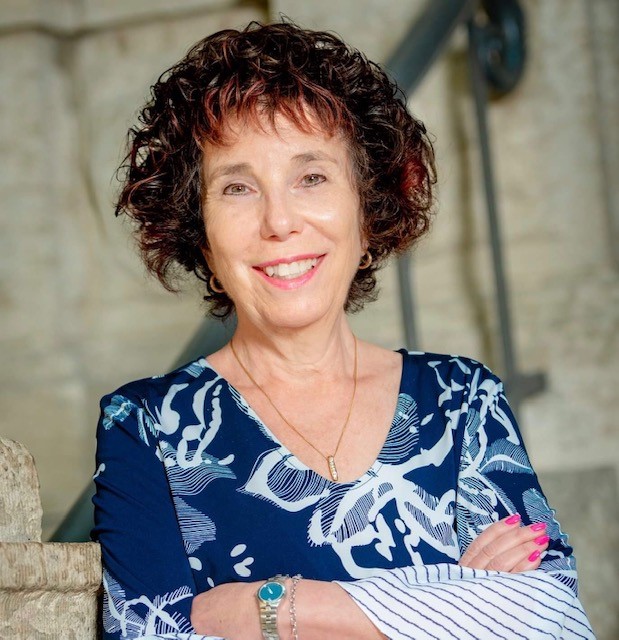
By MYRON LOVE “I loved working at Jewish Child and Family Service,” says Cheryl Hirsh Katz, who is due to retire at the end of June. “I have always appreciated the warm and welcoming atmosphere here. I feel that the people working here are my extended family. I am going to miss my colleagues”.
“I have derived great satisfaction over the years to have been able to help many people in our community of all ages through my work at JCFS,” she continues.
After 44 years at the agency, Katz, the longest-serving member of the staff, was given an appreciative send-off at the JCFS’s recent (June 23) Annual General Meeting at the Shaarey Zedek Synagogue.
The daughter of Art and Bess Hirsh, Cheryl grew up in Garden City. She attended Peretz School, then Jefferson Junior High and Garden City Collegiate. She joined the staff of JCFS in 1981, shortly after receiving her Bachelor of Social Work degree.
She earned an MSW in 1990.
“I chose to become a social worker,” she recalls, “because I always wanted to be able to help people.”
Katz was originally hired by JCFS to work with newcomers. After a couple of years, she was given responsibility for looking after the needs of older adults.
“I really enjoyed working in older adult services,” she says. “That is where I spent the bulk of my time at JCFS.”
After ten years as a case worker, she was promoted to a supervisory role. Later, she was also given responsibility for mental health and addictions programming and settlement services, while keeping the older adult files under her purview.
“As a supervisor, I wasn’t directly involved with individual clients,” she points out. “I was more involved with programming. Among the programs for seniors we organized were – for example – sessions on elder abuse, digital storytelling and memory loss.”
She notes that one of the trends she has seen over the last 44 years is that people are living longer and living in their homes longer. A lot more of our clients are living well into their 90s,” she observes. “We have had to continually expand our staff and the services we provide in order to accommodate the growing demands of an aging population.”
She also spoke of the mental health needs of seniors and aging Holocaust survivors.
She says that she has mixed feelings about leaving JCFS. “After so many years working full time, I am going to have to create a new routine,” she comments.
She notes that, now that she is retired, she will have more time to spend with her parents – who are in their 90s.
And then, there are the two dogs to look after. “I will have time now to try new activities,” she says. “ I might learn to play mah-jong.”
She speaks about maybe doing some traveling – although her husband, Murray, is still working full time.
(She and Murray have one daughter, Farah.)
“Retirement may also include some volunteering,” she adds.
It is quite likely, she will be continuing her association with JCFS but in a volunteer capacity.
Local News
Gray Academy students shine in provincial, national debating competitions
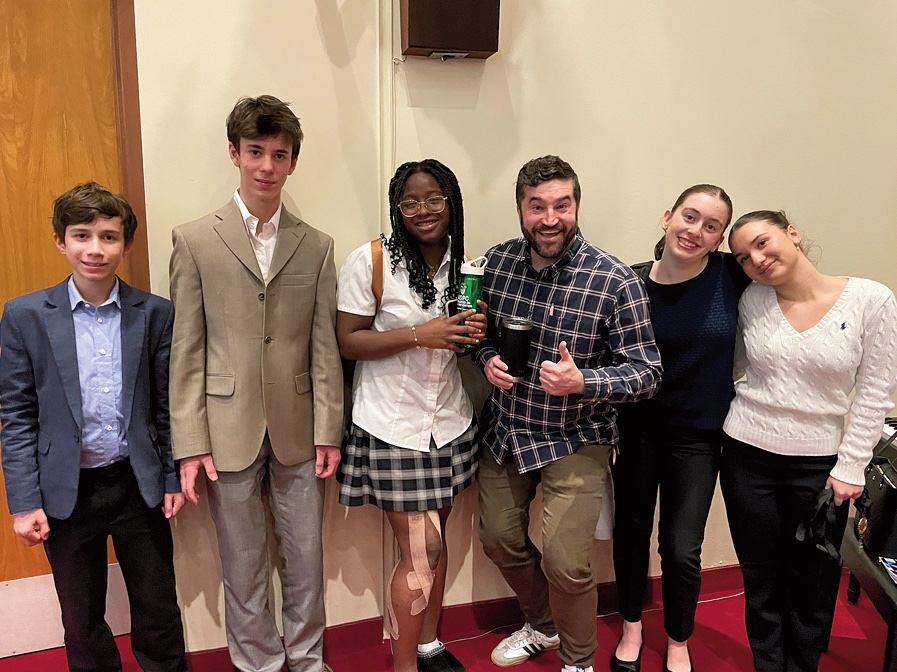
By MYRON LOVE It has been another good year for Gray Academy’s high school students who participated in provincial and national debating competitions. The best results were recorded by Grade 9 student Noa Mednikov, who finished fourth overall nationally, fourth in interpretive reading, and fifth in persuasive speaking at the junior National Public Speaking Championship in early May in Vancouver.
Last October, in the Junior Provincial British Parliamentary Championship – which was held at St. John’s-Ravenscourt – Noa and her partner, Raya Braunstein, finished third as a team while Raya placed third in individual debating.
Their fellow Grade 9 student Maxim Moscalenkov tied for first in persuasive speaking in Vancouver, while the Gray Academy team of Gabe Tapper and Aaron Koplovich finished fifth. Aaron also finished fifth in his individual debate.
Earlier, in March, Maxim finished fifth in the Provincial Juniors debating competition, which was held at Balmoral Hall He and his debate partner, Nate Shenkarow, finished seventh among the teams entered. Last November, he and partner, Ethan Tenenbein, finished seventh in the Junior Prepared Tournament – just behind the Gray Academy team of Nate Shenkarow and Jack Kay.
At the senior high level in that competition, the team of Jacob Tenenbein and Jonah Novoseller finished fourth and Jacob was recognized as fifth best in an individual capacity. Jonah and Jacob also paired up to win the Asper Cup, which was held at their home school.
Jacob represented Manitoba at the Junior National Speech Championship in Vancouver in May and, last October, he and Grade 12 Gray Academy students Julie Krozkin and Daniel Bokser represented Canada at an international debating tournament in Bermuda.
Gray Academy’s debating program was introduced by Linda Martin in 2003. She also led the debating teams at Balmoral Hall. In 2011, Martin was succeeded by Gray Academy high school English teacher Andrew Kaplan.
“Andrew has done a wonderful job with the debating program” says Martin, who has a debating trophy at Gray Academy named in her honour, as well as a provincial trophy for best individual junior debater. “Over the years, Gray Academy students have done very well in many local, national and international competitions,” she adds.
About three weeks ago, this writer had the opportunity to sit down with Andrew Kaplan and six of the school’s top debaters while they discussed the benefits of learning how to debate. According to Noah Strauss – who competed in the Junior Provincials at Balmoral Hall in March, public speaking leaves him with a feeling of accomplishment.
“It’s a good skill set to have,” he observes. “It builds confidence.”
“A benefit of being able to debate is that you learn how to convince people that you know what you are talking about,” adds Maxim Moscolenkov.
Raya Braunstein notes that being able to debate is a skill that she expects to be helpful in many university courses which she may choose to take.
As Andrew Kaplan notes, the ability to express yourself has a great impact in whatever career you choose to pursue.
He points out that debating is compulsory at Gray Academy for all Grade 7 and 8 students – and students can continue debating as an option in the higher grades
Of course, competitive debating is not for everyone. For those students who opt to take that path, the journey begins with internal school debate competition – with the top debating teams and individuals qualifying for local tournaments and – potentially – beyond.
Andrew Kaplan reports that a small number of high schools in Winnipeg and southern Manitoba have active debating programs – including St. Johns Ravenscourt, St. Paul’s High School, St. Mary’s Academy, Garden City and Maples Collegiates in the Seven Oaks School Division, St. Maurice (a Catholic School), as well as Morden Collegiate and Dasmesh, a Sikh private school.
Kaplan expresses his appreciation to the Asper Foundation and an endowment spearheaded by the Kives Family for providing funding for the Gray Academy debating program – as well as the Andrew Slough Foundation – which was established by his friends in memory of the outstanding former Ravenscourt student debater and lawyer who passed away suddenly two years ago at the still young age of 38.
I am confident that our Jewish community can look forward to the continued success of Gray Academy’s star debaters and to the continual emergence of future stars as the times goes by.
Local News
Antisemitism has crept into grade school in Canada
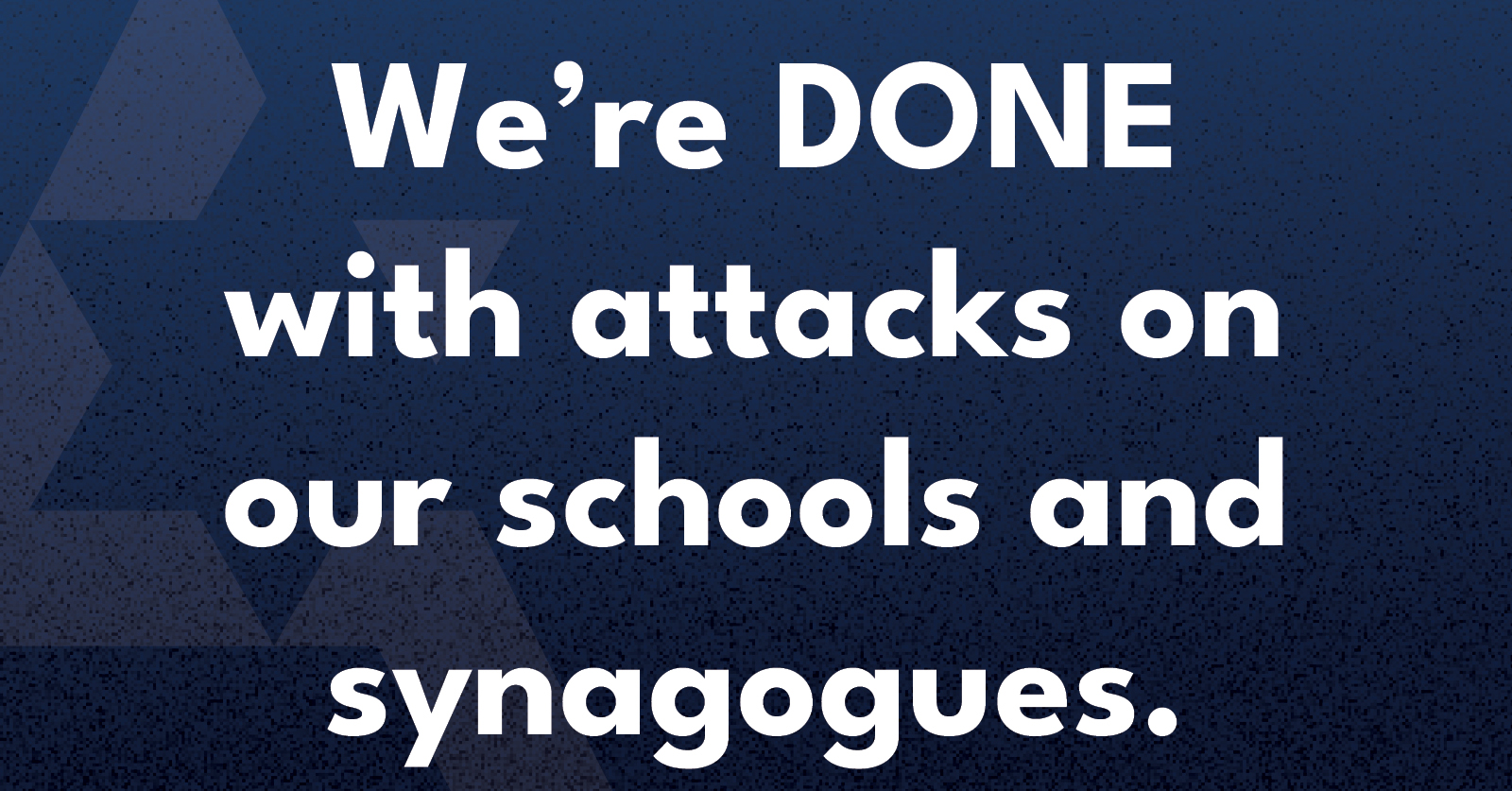
Antisemitism in Canada has moved beyond protests and politics; it is now entering classrooms and altering how Jewish children see themselves functioning within them.
A a university student I have observed the experience of my younger brother in grade eight as a Jewish student. Over the past few months, his school has been at the center of several deeply troubling incidents that have made him feel unsafe in our parks, community, and even his school. Swastikas were drawn around the community, in parks and ponds. Additionally, an older man, who claims to be a pro-Palestinian influencer, stood outside his predominantly Jewish school wearing a keffiyeh, filming a video which then circulated between students on TikTok.
This same man later showed up to our local Jewish community center in keffiyeh to allegedly watch his son play basketball where my brother and many of his classmates go for their lessons, basketball games, and Jewish events. These moments made him and his peers feel watched and targeted just for being Jewish. Local political representatives condemned the incidents and raised awareness about antisemitism, but the fear among students didn’t go away. The feeling of being targeted for simply existing has been taught to my brother, something my parents had tried their hardest to escape from.
Most recently, my brother was chosen to represent his school at a regional science fair. When one of the judges arrived wearing a keffiyeh, he froze. For many, including my brother after the incidents he has faced, the keffiyeh represents a political message. But even more so for my younger brother, it is tied to the fear and intimidation he had already experienced. He felt nervous, distracted, and unsure of how to act.
This is not about silencing political expression. It is about a child who came to share his ideas and left feeling uncertain and afraid. It is about the atmosphere forming in Canadian schools, where Jewish students are being made to feel targeted and unwelcome.
His school made an effort to address the incidents, but the impact is lasting. Posts on social media, much can be very vague at times about inclusion cannot fully undo the feeling of being singled out. A kind word from a teacher does not erase the fear that builds when threats are left unspoken but deeply felt.
I am writing this as a sister who watched her younger brother lose a moment that should have been filled with confidence and pride. He deserved to feel safe. So do all Jewish students in this country.
Moving forward, schools must take concrete steps to protect all students. Antisemitism cannot only be addressed when it becomes violent or overt. It must also be recognized when it appears as intimidation, symbolic targeting, or political messaging that creates fear among students. Children should never have to question whether they are safe in their own classrooms or community spaces.
Events that are meant to support and celebrate students must remain focused on them. Individuals who feel the need to bring political symbols or messages into school grounds or children’s events should not be welcomed in those spaces. Schools must make it clear that their environments exist to support learning, safety, and inclusion, not to host agendas that can intimidate or isolate students.
Administrators and educators must develop clear guidelines for identifying and responding to antisemitic behavior in all its forms. This includes strengthening security measures, offering ongoing staff training, and engaging directly with Jewish families to understand their concerns. Inclusion is not a one-time statement. It is a responsibility that must be reflected in everyday decisions and actions. No child should ever feel unsafe or unwelcome because of their identity.
The author is a Campus Media Fellow with HonestReporting Canada and Allied Voices for Israel who lives in Toronto.
